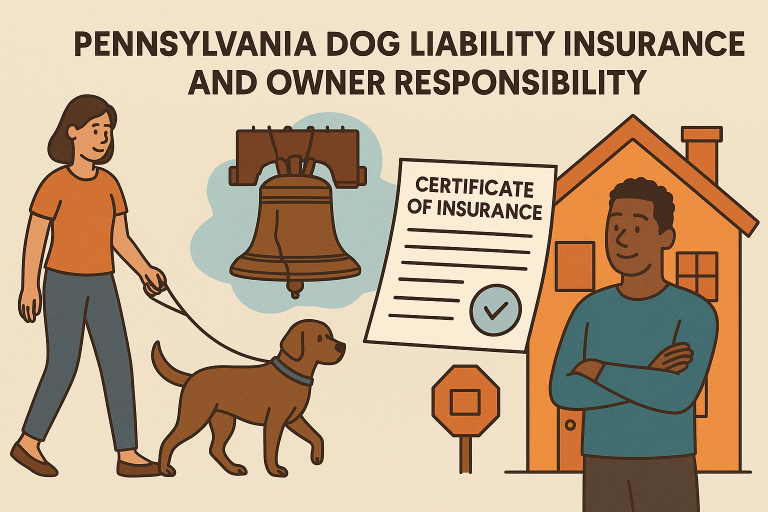Living with a dog in Pennsylvania comes with real responsibility, especially if you rent your home. From statewide liability laws to the paperwork landlords often ask for, understanding your obligations as a dog owner is key to staying protected. This guide breaks down what Pennsylvania law says about dog liability and when renters need to show proof of insurance coverage.
Pennsylvania Dog Liability Law: The Basics
Pennsylvania’s dog laws are designed to protect both people and animals. Under Pennsylvania dog liability law, owners are held responsible if their dog injures another person or animal, especially when the owner was negligent or the dog had a known history of aggression.
The state operates under a form of modified strict liability. That means:
-
If your dog bites someone without provocation, you may be held liable even if it’s the first incident.
-
If your dog has a history of biting or showing aggression and you fail to control or contain it, you could face even more serious consequences, including civil penalties or criminal charges.
The law places a clear expectation on owners to properly supervise and restrain their dogs, whether in public or private settings. This includes securing gates, using leashes, and following local ordinances—especially in urban areas like Philadelphia or Pittsburgh.
When Renters Need Dog Liability Insurance in PA
If you rent in Pennsylvania and own a dog, there’s a good chance your landlord will require you to carry dog liability insurance. This is particularly true if:
-
You have a large breed or a breed considered “restricted” by property managers.
-
Your dog has a history of biting or behavioral issues.
-
The rental property has common areas, shared outdoor spaces, or is in a high-density apartment complex.
Many leases include a clause requiring proof of liability coverage, typically in the form of a Certificate of Insurance (COI). This document shows that you’re covered for third-party injuries or property damage caused by your dog.
If your landlord asks for a COI for dog renters in PA, make sure it includes:
-
Your name and rental address
-
The dog’s breed and name, if required
-
Coverage amounts that meet or exceed the lease terms
-
The landlord or property management company listed as an additional interested party, if requested
What Dog Liability Insurance Covers
Dog liability insurance PA policies are designed to help you cover expenses if your dog causes harm. This includes:
-
Bodily injury: Medical bills, lost wages, or legal claims if your dog bites or injures someone
-
Property damage: Repair costs if your dog damages a neighbor’s fence, scratches a car, or ruins personal belongings
It’s worth noting that most dog liability policies do not cover injuries to you or your household members, since these are typically addressed by health insurance or homeowners/renters insurance policies.
If your lease requires a specific level of coverage, you’ll want to confirm the policy limits before purchasing. Coverage levels often start at $25,000 and can go up to $300,000 or more.
Aggressive Breeds and Insurance in Pennsylvania
While Pennsylvania law does not single out certain breeds as “dangerous,” many landlords and insurers still impose breed restrictions. Common breeds flagged in rental agreements include:
-
Pit Bulls
-
Rottweilers
-
Doberman Pinschers
-
German Shepherds
-
Mastiffs
-
Akitas
If you own one of these breeds, you may be asked to obtain a standalone dog liability policy, even if your renters insurance already includes some level of liability protection. This helps assure landlords that you’re prepared to cover any damages related to your pet.
In these cases, a COI becomes more than just a formality it’s proof that you’re meeting lease requirements and helping reduce risk for the property owner.
What Happens If You’re Uninsured?
Failing to carry dog liability insurance when required can have serious consequences for renters in Pennsylvania. If your dog injures someone and you’re uninsured, you could be personally liable for:
-
Medical costs
-
Legal fees
-
Property repairs
-
Lease violations or eviction
In some cases, landlords may cancel your lease or refuse to renew it. Worse, legal action could be taken if your dog is deemed dangerous and causes unprovoked harm.
Being proactive with coverage helps prevent those outcomes. It also demonstrates responsibility and gives landlords confidence in your commitment to safe pet ownership.
Final Thoughts: Protecting Your Lease and Your Pet
Navigating dog liability insurance in Pennsylvania doesn’t have to be complicated. Whether you own a mild-mannered Maltese or a more misunderstood breed like a Pit Bull, having the right coverage matters, especially as a renter.
Start by checking your lease. If it mentions a requirement for dog liability insurance or a COI, don’t wait until you’re asked. Get coverage that matches the lease terms and submit your COI as early as possible.
It’s not just about meeting a rule. It’s about protecting your dog, your neighbors, and your right to stay in your rental home. A little paperwork today can help you avoid a lot of trouble down the road.



